北师大版(2019)必修 第三册Unit 7 Art Lesson 3 A Musical Genius课件(共25张PPT)
文档属性
| 名称 | 北师大版(2019)必修 第三册Unit 7 Art Lesson 3 A Musical Genius课件(共25张PPT) |
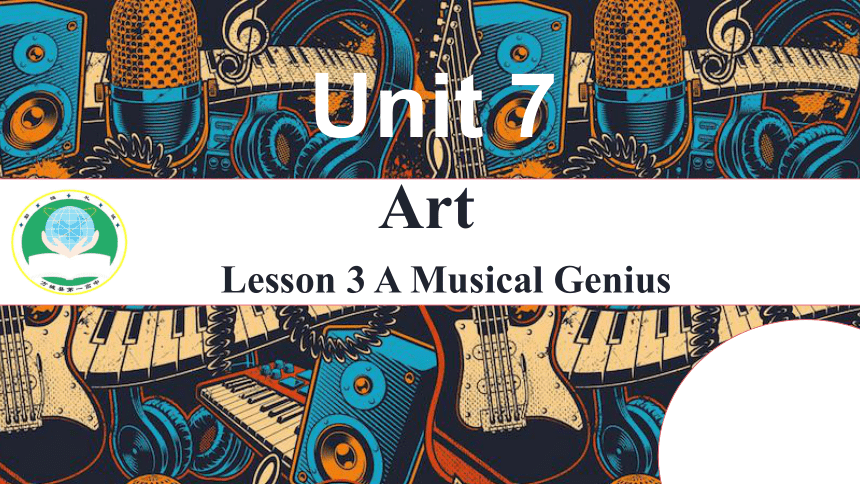
|
|
| 格式 | pptx | ||
| 文件大小 | 1.8MB | ||
| 资源类型 | 教案 | ||
| 版本资源 | 北师大版(2019) | ||
| 科目 | 英语 | ||
| 更新时间 | 2024-03-20 20:17:27 | ||
图片预览

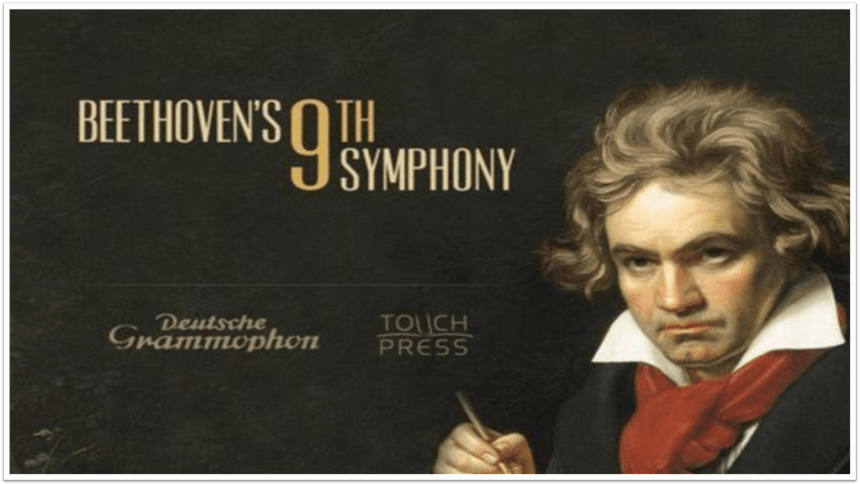
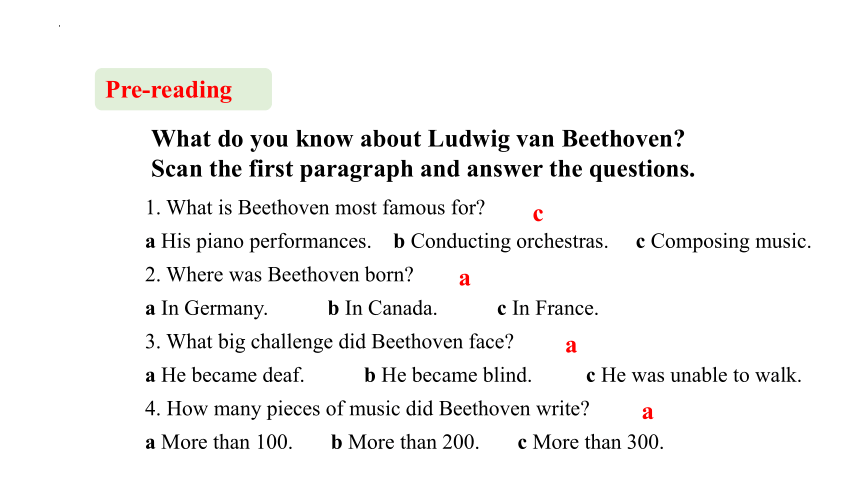
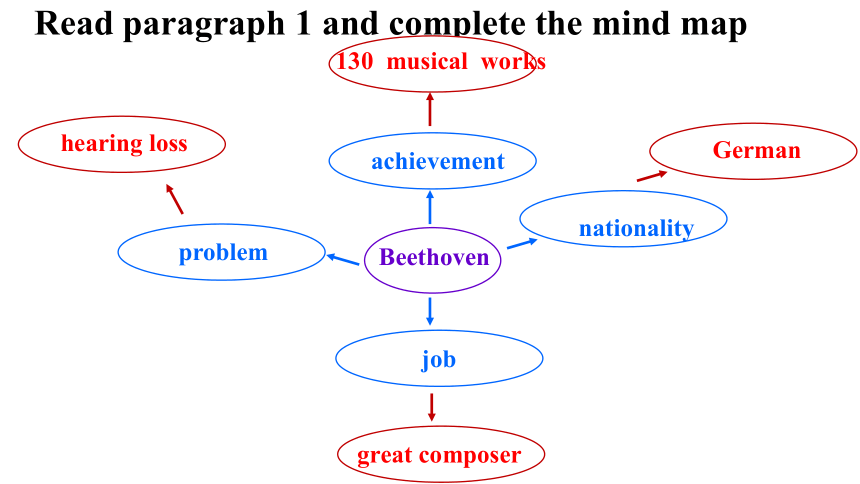
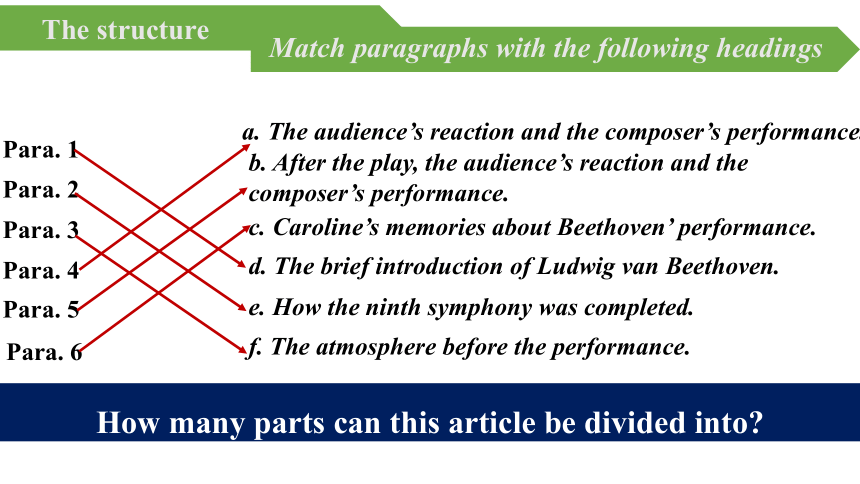
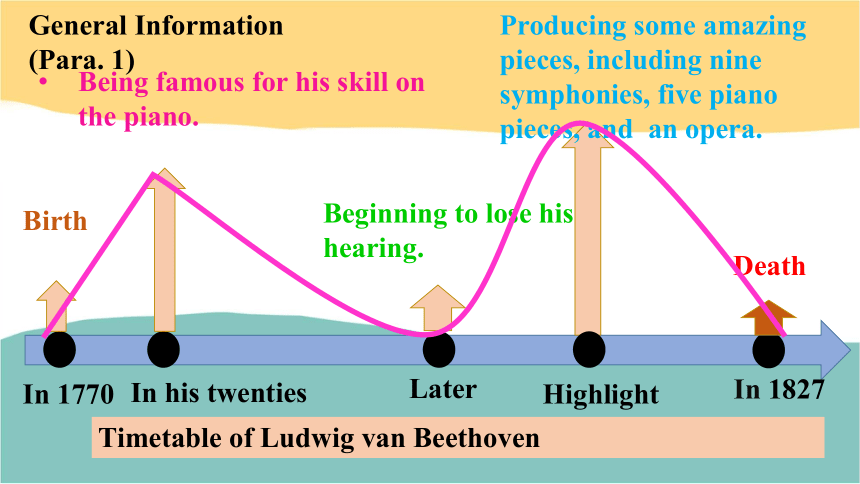
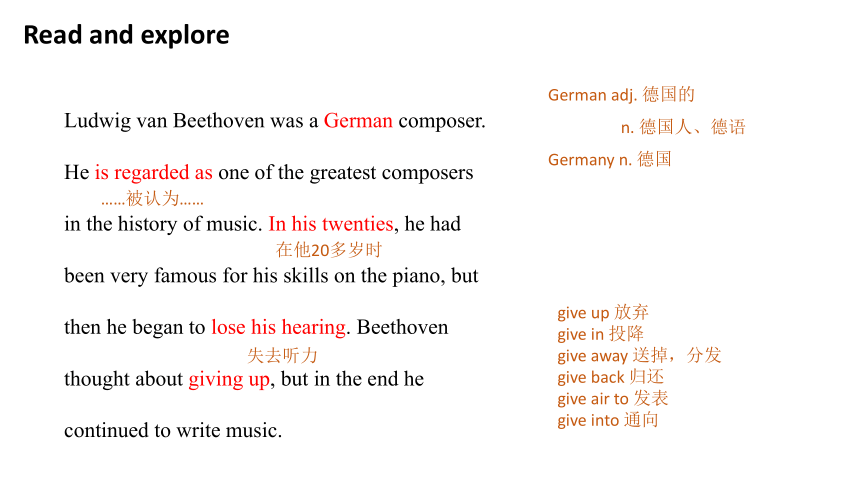
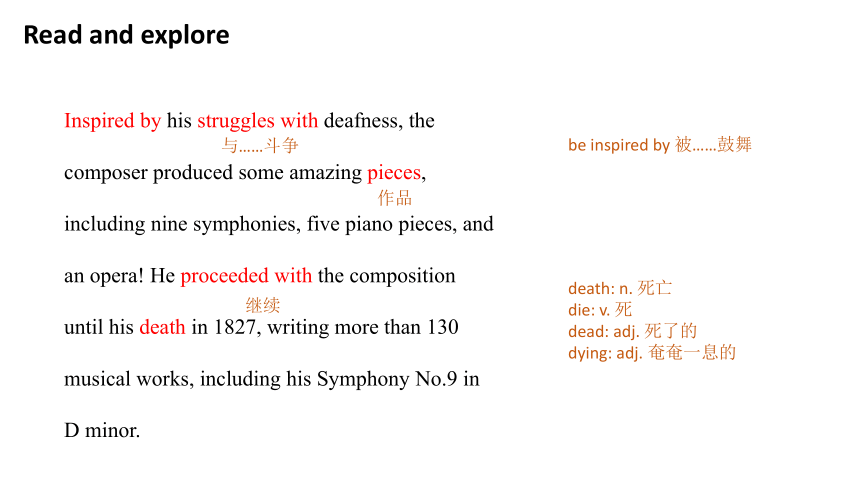
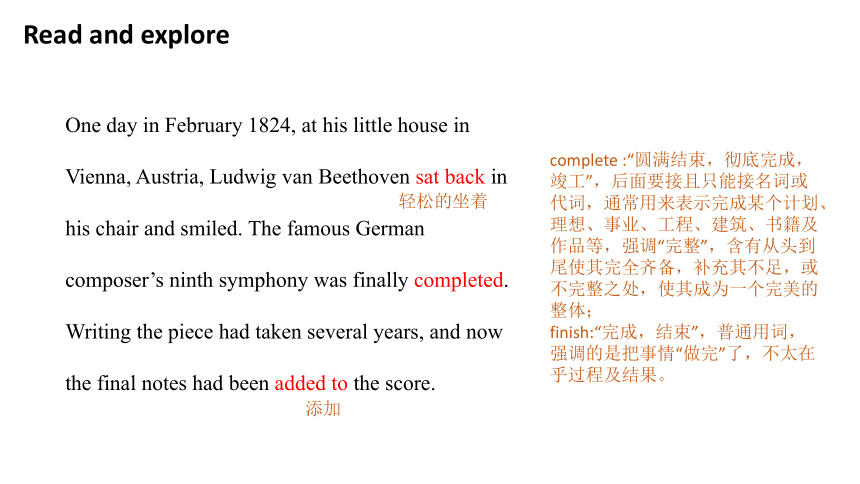
文档简介
(共25张PPT)
Unit 7
Art
Lesson 3 A Musical Genius
genius
A genius is a highly talented, creative, or intelligent person.
What do you know about Ludwig van Beethoven Scan the first paragraph and answer the questions.
1. What is Beethoven most famous for
a His piano performances. b Conducting orchestras. c Composing music.
2. Where was Beethoven born
a In Germany. b In Canada. c In France.
3. What big challenge did Beethoven face
a He became deaf. b He became blind. c He was unable to walk.
4. How many pieces of music did Beethoven write
a More than 100. b More than 200. c More than 300.
c
a
a
a
Pre-reading
Read paragraph 1 and complete the mind map
Beethoven
achievement
130 musical works
nationality
German
job
great composer
problem
hearing loss
Para. 1
Para. 2
Para. 3
b. After the play, the audience’s reaction and the composer’s performance.
The structure
Match paragraphs with the following headings
Para. 4
Para. 5
Para. 6
d. The brief introduction of Ludwig van Beethoven.
c. Caroline’s memories about Beethoven’ performance.
e. How the ninth symphony was completed.
f. The atmosphere before the performance.
a. The audience’s reaction and the composer’s performance.
How many parts can this article be divided into
In 1770
Birth
Being famous for his skill on the piano.
Later
Beginning to lose his hearing.
Highlight
In 1827
Death
In his twenties
Producing some amazing pieces, including nine symphonies, five piano pieces, and an opera.
Timetable of Ludwig van Beethoven
General Information (Para. 1)
Ludwig van Beethoven was a German composer. He is regarded as one of the greatest composers in the history of music. In his twenties, he had been very famous for his skills on the piano, but then he began to lose his hearing. Beethoven thought about giving up, but in the end he continued to write music.
……被认为……
在他20多岁时
German adj. 德国的
n. 德国人、德语
Germany n. 德国
give up 放弃
give in 投降
give away 送掉,分发
give back 归还
give air to 发表
give into 通向
失去听力
Read and explore
Inspired by his struggles with deafness, the composer produced some amazing pieces, including nine symphonies, five piano pieces, and an opera! He proceeded with the composition until his death in 1827, writing more than 130 musical works, including his Symphony No.9 in D minor.
与……斗争
作品
be inspired by 被……鼓舞
death: n. 死亡
die: v. 死
dead: adj. 死了的
dying: adj. 奄奄一息的
Read and explore
继续
One day in February 1824, at his little house in Vienna, Austria, Ludwig van Beethoven sat back in his chair and smiled. The famous German composer’s ninth symphony was finally completed. Writing the piece had taken several years, and now the final notes had been added to the score.
complete :“圆满结束,彻底完成,竣工”,后面要接且只能接名词或代词,通常用来表示完成某个计划、理想、事业、工程、建筑、书籍及作品等,强调“完整”,含有从头到尾使其完全齐备,补充其不足,或不完整之处,使其成为一个完美的整体;
finish:“完成,结束”,普通用词,强调的是把事情“做完”了,不太在乎过程及结果。
轻松的坐着
添加
Read and explore
At 54 years of age, he didn’t know that this would be his last symphony. As he proudly signed his name at the bottom of the page, Beethoven tried to imagine how people would respond when they heard it for the first time.
for the first time:引导的是并列从句,表示原因的语气很弱,一般是对结果作出推断性的补充说明或解释,不表示直接原因, for前多加逗号.
For the first time in my career, I was failing.
the first time:用作形容词一般修饰单数名词,修饰有few或数词修饰的复数名词时是把复数名词看作一个整体。first与基数词连用时,一般置于基数词前,但first引起的固定词组则应置于基数词之后。
It was the first time we admitted to ourselves that we were tired.
当……时
在……底部
Read and explore
Before the performance, the backstage atmosphere at a very famous theatre in Vienna was tense. Beethoven was afraid that the performance would be a disaster. After all, what use is a conductor who could not hear his orchestra—even if he is a musical genius
above all: 首先,尤其重要的是
Above all, chairs should be comfortable.
afterall: 到底、究竟、毕竟
After all he is still a schoolboy.
at all: 尽然,居然,到底,究竟
Do it well, if you do it at all.
back(后面的)+stage(舞台)=后台的
Read and explore
The audience did not hesitate to applaud loudly as the famous composer walked out onto the stage for the first time in 12 years. The theatre’s musical director, Michael Umlauf, joined him and together the two men took charge of the orchestra, waving his arms wildly in the air, and madly turning the pages of his score.
犹豫做某事
join in多是指去参加某类的组织,而后成为里面的一员。
take part in是表示加入到一个活动之中。
join 表示从参加某一团体并作为其中一员,如果后接人,则表示参加某人的活动。
负责、控制
疯狂地
Read and explore
The whole time, Umlauf stood quietly by his side, skillfully guiding the orchestra through the most amazing piece of music the world had ever known.
quiet: adj. 安静的
quite: adv. 非常、相当
by his side: 在他身边
Read and explore
be buried in: 埋头于、专心于
As the final, joyous note signalled the end of the symphony, the audience jumped to their feet, clapping, cheering and waving their hats. But Beethovern continued conducting, his head buried in the score. It was not until Caroline Unger, one of the singers, took his arm and turned him to face the audience that the great man realised his symphony was a success.
跳起来
Read and explore
挽着胳膊
It was not until Caroline Unger, one of the singers, took his arm and turned him to face the audience that the great man realised his symphony was a success.
It was not until Caroline Unger, one of the singers (插入语), took his arm and turned him to face the audience that the great man realised (省略引导词的宾语从句) his symphony was a success. (not … until 的强调句型)
The great man didn’t realise his symphony was a success until Caroline Unger, one of the singers, took his arm and turned him to face the audience.
直到其中一名歌手卡洛琳.昂格尔拉着他的手臂,让他转身面对观众,这位伟人才意识到他的交响乐取得了成功。
Later, Caroline remembered that Beethoven was not only one who got a surprise. “The audience was shocked as well,” she said with a broad smile. “Most of them had no idea that he was deaf! The one person in the room who didn’t hear the symphony—and never would—was the very man who composed it.”
也,又,再
开怀大笑
the very man: 就是那个人、正是那个人
Read and explore
Answer the questions based on your notes. Read the story again if needed.
4
1. When and how was Symphony No. 9 completed What was Beethoven thinking when he finished the symphony
2. How do you think Beethoven felt while he was conducting the orchestra Find evidence from the text.
In February 1824. Writing the piece had taken several years, and now the final notes had been added to the score. He was proud and pleased.
He felt absorbed and passionate.
Beethoven is described as “jumped about”, “waving his arms”, and “madly turning the pages of his score”.
In 1770
Birth
Being famous for his skill on the piano.
Later
Beginning to lose his hearing.
Highlight
In 1827
Death
In his twenties
Producing some amazing pieces, including nine symphonies, five piano pieces, and an opera.
Timetable of Ludwig van Beethoven
Try to retell the life of Beethoven
Composing of Symphony No.9 (Para. 2)
Ludwig van Beethoven
1. When and how was Symphony No.9
completed
2. What was Beethoven thinking when
he finished the Symphony No.9
Performance of Symphony No. 9 (Para 3 ~ 6)
Ludwig van Beethoven:
Before
During
After
The audience:
Read sentences related to people’s reactions and use some adjectives to describe them.
Read and complete the sentences with the phrases below.
7
took charge of, waving their hats, waving his arms wildly, jumped about, turned him to face, backstage atmosphere,
madly turning the pages, jumped to their feet, with a broad smile
1. Before the performance, the _______________________ was tense.
2. Michael Umlauf joined him and together the two men _____________ the Orchestra.
3. Beethoven _____________ in front of the orchestra, ______________ in the air, and _____________________ of his score.
backstage atmosphere
took charge of
jumped about
waving his arms wildly
madly turning the pages
took charge of, waving their hats, waving his arms wildly, jumped about, turned him to face, backstage atmosphere,
madly turning the pages, jumped to their feet, with a broad smile
4. As the final note signalled the end, the audience _________________, clapping, cheering, and _______________.
5. Caroline Unger took Beethoven’s arm and________________ the
audience.
6. In an interview afterwards, Caroline said _________________, “The audience was shocked as well.
jumped to their feet
waving their hats
turned him to face
with a broad smile
Complete the Word Builder. You may use a dictionary to help you.
8
Noun Verb Adjective
music musician —
composition —
performance —
produce
— conduct —
hesitate
enjoy
respond
composer
compose
performer
producer
musical
perform
production
productive
conductor
hesitation
hesitated
joy
joyous
responsive
response
Complete the sentences with the correct form of the words in the Word Builder.
9
1 It has always been my dream to ________ an orchestra.
2 The musician ____________ with nervousness before he began to play.
3 Beethoven is recognised as a ____________ genius by people around the world.
4 Beethoven is the ____________ of Symphony No. 9 in D minor.
conduct
hesitated
musical
composer
5 To his mother’s _______, he won first prize.
6 She told me about the wonderful ________________ that she had been to last week.
7 The audience’s ___________ to the performance of the symphony was extraordinary.
8 Though Beethoven lost his hearing, he _________ some amazing pieces of music.
joy
performance
response
produced
Unit 7
Art
Lesson 3 A Musical Genius
genius
A genius is a highly talented, creative, or intelligent person.
What do you know about Ludwig van Beethoven Scan the first paragraph and answer the questions.
1. What is Beethoven most famous for
a His piano performances. b Conducting orchestras. c Composing music.
2. Where was Beethoven born
a In Germany. b In Canada. c In France.
3. What big challenge did Beethoven face
a He became deaf. b He became blind. c He was unable to walk.
4. How many pieces of music did Beethoven write
a More than 100. b More than 200. c More than 300.
c
a
a
a
Pre-reading
Read paragraph 1 and complete the mind map
Beethoven
achievement
130 musical works
nationality
German
job
great composer
problem
hearing loss
Para. 1
Para. 2
Para. 3
b. After the play, the audience’s reaction and the composer’s performance.
The structure
Match paragraphs with the following headings
Para. 4
Para. 5
Para. 6
d. The brief introduction of Ludwig van Beethoven.
c. Caroline’s memories about Beethoven’ performance.
e. How the ninth symphony was completed.
f. The atmosphere before the performance.
a. The audience’s reaction and the composer’s performance.
How many parts can this article be divided into
In 1770
Birth
Being famous for his skill on the piano.
Later
Beginning to lose his hearing.
Highlight
In 1827
Death
In his twenties
Producing some amazing pieces, including nine symphonies, five piano pieces, and an opera.
Timetable of Ludwig van Beethoven
General Information (Para. 1)
Ludwig van Beethoven was a German composer. He is regarded as one of the greatest composers in the history of music. In his twenties, he had been very famous for his skills on the piano, but then he began to lose his hearing. Beethoven thought about giving up, but in the end he continued to write music.
……被认为……
在他20多岁时
German adj. 德国的
n. 德国人、德语
Germany n. 德国
give up 放弃
give in 投降
give away 送掉,分发
give back 归还
give air to 发表
give into 通向
失去听力
Read and explore
Inspired by his struggles with deafness, the composer produced some amazing pieces, including nine symphonies, five piano pieces, and an opera! He proceeded with the composition until his death in 1827, writing more than 130 musical works, including his Symphony No.9 in D minor.
与……斗争
作品
be inspired by 被……鼓舞
death: n. 死亡
die: v. 死
dead: adj. 死了的
dying: adj. 奄奄一息的
Read and explore
继续
One day in February 1824, at his little house in Vienna, Austria, Ludwig van Beethoven sat back in his chair and smiled. The famous German composer’s ninth symphony was finally completed. Writing the piece had taken several years, and now the final notes had been added to the score.
complete :“圆满结束,彻底完成,竣工”,后面要接且只能接名词或代词,通常用来表示完成某个计划、理想、事业、工程、建筑、书籍及作品等,强调“完整”,含有从头到尾使其完全齐备,补充其不足,或不完整之处,使其成为一个完美的整体;
finish:“完成,结束”,普通用词,强调的是把事情“做完”了,不太在乎过程及结果。
轻松的坐着
添加
Read and explore
At 54 years of age, he didn’t know that this would be his last symphony. As he proudly signed his name at the bottom of the page, Beethoven tried to imagine how people would respond when they heard it for the first time.
for the first time:引导的是并列从句,表示原因的语气很弱,一般是对结果作出推断性的补充说明或解释,不表示直接原因, for前多加逗号.
For the first time in my career, I was failing.
the first time:用作形容词一般修饰单数名词,修饰有few或数词修饰的复数名词时是把复数名词看作一个整体。first与基数词连用时,一般置于基数词前,但first引起的固定词组则应置于基数词之后。
It was the first time we admitted to ourselves that we were tired.
当……时
在……底部
Read and explore
Before the performance, the backstage atmosphere at a very famous theatre in Vienna was tense. Beethoven was afraid that the performance would be a disaster. After all, what use is a conductor who could not hear his orchestra—even if he is a musical genius
above all: 首先,尤其重要的是
Above all, chairs should be comfortable.
afterall: 到底、究竟、毕竟
After all he is still a schoolboy.
at all: 尽然,居然,到底,究竟
Do it well, if you do it at all.
back(后面的)+stage(舞台)=后台的
Read and explore
The audience did not hesitate to applaud loudly as the famous composer walked out onto the stage for the first time in 12 years. The theatre’s musical director, Michael Umlauf, joined him and together the two men took charge of the orchestra, waving his arms wildly in the air, and madly turning the pages of his score.
犹豫做某事
join in多是指去参加某类的组织,而后成为里面的一员。
take part in是表示加入到一个活动之中。
join 表示从参加某一团体并作为其中一员,如果后接人,则表示参加某人的活动。
负责、控制
疯狂地
Read and explore
The whole time, Umlauf stood quietly by his side, skillfully guiding the orchestra through the most amazing piece of music the world had ever known.
quiet: adj. 安静的
quite: adv. 非常、相当
by his side: 在他身边
Read and explore
be buried in: 埋头于、专心于
As the final, joyous note signalled the end of the symphony, the audience jumped to their feet, clapping, cheering and waving their hats. But Beethovern continued conducting, his head buried in the score. It was not until Caroline Unger, one of the singers, took his arm and turned him to face the audience that the great man realised his symphony was a success.
跳起来
Read and explore
挽着胳膊
It was not until Caroline Unger, one of the singers, took his arm and turned him to face the audience that the great man realised his symphony was a success.
It was not until Caroline Unger, one of the singers (插入语), took his arm and turned him to face the audience that the great man realised (省略引导词的宾语从句) his symphony was a success. (not … until 的强调句型)
The great man didn’t realise his symphony was a success until Caroline Unger, one of the singers, took his arm and turned him to face the audience.
直到其中一名歌手卡洛琳.昂格尔拉着他的手臂,让他转身面对观众,这位伟人才意识到他的交响乐取得了成功。
Later, Caroline remembered that Beethoven was not only one who got a surprise. “The audience was shocked as well,” she said with a broad smile. “Most of them had no idea that he was deaf! The one person in the room who didn’t hear the symphony—and never would—was the very man who composed it.”
也,又,再
开怀大笑
the very man: 就是那个人、正是那个人
Read and explore
Answer the questions based on your notes. Read the story again if needed.
4
1. When and how was Symphony No. 9 completed What was Beethoven thinking when he finished the symphony
2. How do you think Beethoven felt while he was conducting the orchestra Find evidence from the text.
In February 1824. Writing the piece had taken several years, and now the final notes had been added to the score. He was proud and pleased.
He felt absorbed and passionate.
Beethoven is described as “jumped about”, “waving his arms”, and “madly turning the pages of his score”.
In 1770
Birth
Being famous for his skill on the piano.
Later
Beginning to lose his hearing.
Highlight
In 1827
Death
In his twenties
Producing some amazing pieces, including nine symphonies, five piano pieces, and an opera.
Timetable of Ludwig van Beethoven
Try to retell the life of Beethoven
Composing of Symphony No.9 (Para. 2)
Ludwig van Beethoven
1. When and how was Symphony No.9
completed
2. What was Beethoven thinking when
he finished the Symphony No.9
Performance of Symphony No. 9 (Para 3 ~ 6)
Ludwig van Beethoven:
Before
During
After
The audience:
Read sentences related to people’s reactions and use some adjectives to describe them.
Read and complete the sentences with the phrases below.
7
took charge of, waving their hats, waving his arms wildly, jumped about, turned him to face, backstage atmosphere,
madly turning the pages, jumped to their feet, with a broad smile
1. Before the performance, the _______________________ was tense.
2. Michael Umlauf joined him and together the two men _____________ the Orchestra.
3. Beethoven _____________ in front of the orchestra, ______________ in the air, and _____________________ of his score.
backstage atmosphere
took charge of
jumped about
waving his arms wildly
madly turning the pages
took charge of, waving their hats, waving his arms wildly, jumped about, turned him to face, backstage atmosphere,
madly turning the pages, jumped to their feet, with a broad smile
4. As the final note signalled the end, the audience _________________, clapping, cheering, and _______________.
5. Caroline Unger took Beethoven’s arm and________________ the
audience.
6. In an interview afterwards, Caroline said _________________, “The audience was shocked as well.
jumped to their feet
waving their hats
turned him to face
with a broad smile
Complete the Word Builder. You may use a dictionary to help you.
8
Noun Verb Adjective
music musician —
composition —
performance —
produce
— conduct —
hesitate
enjoy
respond
composer
compose
performer
producer
musical
perform
production
productive
conductor
hesitation
hesitated
joy
joyous
responsive
response
Complete the sentences with the correct form of the words in the Word Builder.
9
1 It has always been my dream to ________ an orchestra.
2 The musician ____________ with nervousness before he began to play.
3 Beethoven is recognised as a ____________ genius by people around the world.
4 Beethoven is the ____________ of Symphony No. 9 in D minor.
conduct
hesitated
musical
composer
5 To his mother’s _______, he won first prize.
6 She told me about the wonderful ________________ that she had been to last week.
7 The audience’s ___________ to the performance of the symphony was extraordinary.
8 Though Beethoven lost his hearing, he _________ some amazing pieces of music.
joy
performance
response
produced
同课章节目录
- Unit 7 Art
- Lesson 1 Masterpieces
- Lesson 2 Beijing Opera
- Lesson 3 A Musical Genius
- Unit 8 Green living
- Lesson 1 Roots and Shoots
- Lesson 2 Greening the Desert
- Lesson 3 "White Bikes" on the Road
- Unit 9 Learning
- Lesson 1 Active Learning
- Lesson 2 Language Learning Tips
- Lesson 3 The Secrets of Your Memory
